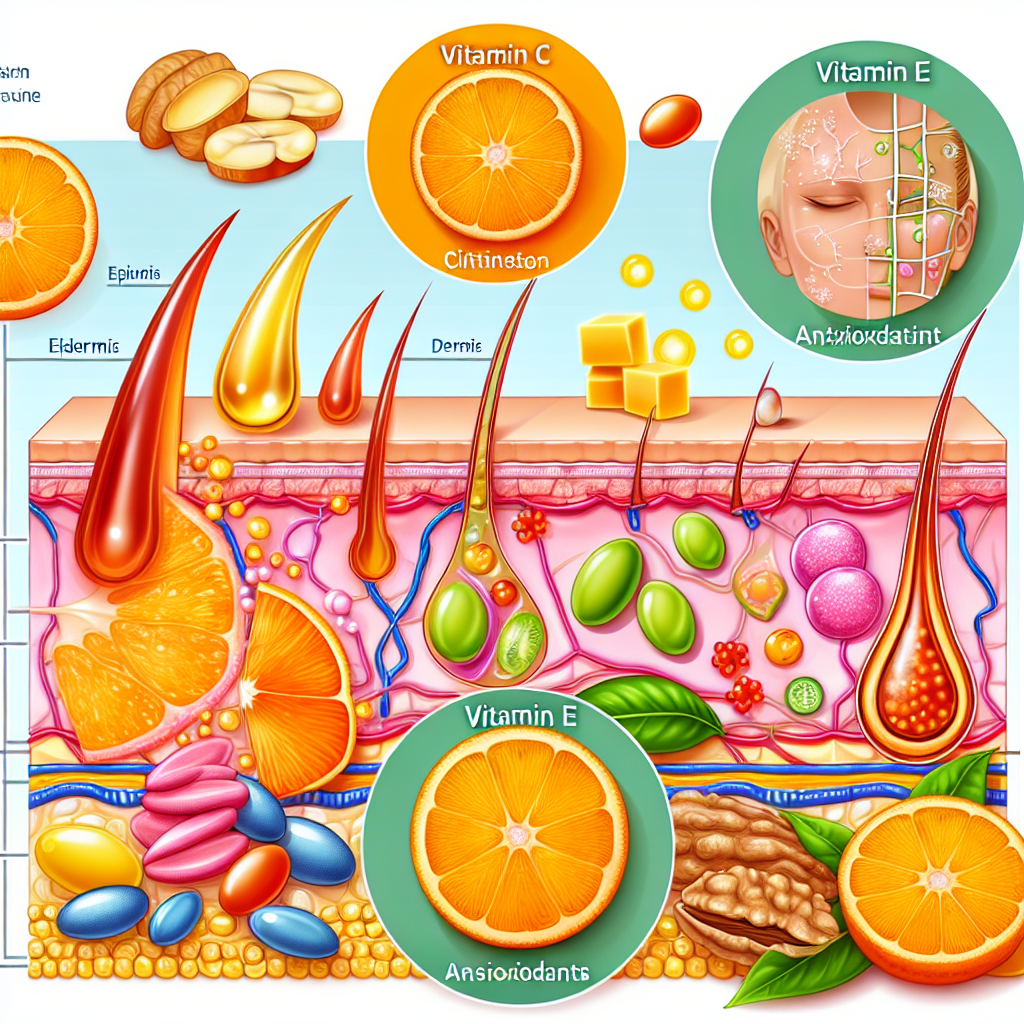How Vitamin C and E Keep Your Skin Glowing

Discover how Vitamins C and E can keep your skin glowing! Learn more about their benefits and how to incorporate them into your skincare routine. Don’t wait, start your journey to healthier, radiant skin today. Click here to find out more.
The Role of Vitamin C and E in Achieving Radiant Skin
The quest for radiant, glowing skin is a journey that many embark on, but few truly understand the science behind achieving this coveted glow. The secret to radiant skin lies not only in the products we apply topically but also in the nutrients we consume. Among these nutrients, two vitamins stand out for their remarkable benefits to the skin: Vitamin C and Vitamin E.
Vitamin C, also known as ascorbic acid, is a potent antioxidant that plays a crucial role in maintaining skin health. It is water-soluble and found in various fruits and vegetables, such as oranges, strawberries, and bell peppers. When consumed or applied topically, Vitamin C aids in neutralizing harmful free radicals that can damage the skin. These free radicals, often a result of environmental stressors like pollution and UV radiation, can accelerate the aging process, leading to wrinkles and fine lines. By neutralizing these free radicals, Vitamin C helps to slow down the aging process, resulting in a more youthful and vibrant complexion.
Moreover, Vitamin C is essential for the production of collagen, a protein that provides structure and elasticity to the skin. As we age, our bodies produce less collagen, leading to sagging skin and the formation of wrinkles. By boosting collagen production, Vitamin C helps to maintain the skin’s firmness and elasticity, contributing to a more youthful appearance.
On the other hand, Vitamin E, a fat-soluble vitamin found in nuts, seeds, and leafy greens, works synergistically with Vitamin C to enhance its antioxidant effects. It is particularly effective in protecting the skin from UV damage. When applied topically, Vitamin E absorbs the harmful UV light from the sun, preventing DNA damage and reducing the risk of skin cancer. It also has anti-inflammatory properties, helping to soothe and calm irritated skin.
In addition to its protective role, Vitamin E also aids in skin repair. It accelerates the healing process of damaged skin and reduces the appearance of scars. This makes it a valuable ingredient in products designed to treat acne, as it can help to heal blemishes and prevent scarring.
Furthermore, Vitamin E helps to keep the skin hydrated by strengthening the skin’s barrier function. A strong skin barrier prevents water loss, keeping the skin moisturized and plump. This is particularly beneficial for those with dry or mature skin, as it can help to reduce the appearance of fine lines and wrinkles.
In conclusion, the combination of Vitamin C and E provides a powerful defense against environmental stressors, promotes skin repair, and maintains skin hydration and elasticity. Incorporating these vitamins into your skincare routine and diet can significantly improve your skin’s health and appearance, bringing you one step closer to achieving that coveted glow. However, it’s important to remember that while these vitamins are beneficial, they are not a substitute for a balanced diet, adequate hydration, and a good skincare routine. Achieving radiant skin is a holistic process that requires a comprehensive approach to health and wellness.
Unlocking the Secret to Glowing Skin: The Power of Vitamins C and E

Unlocking the secret to glowing skin is a quest that many embark on, but few truly master. The beauty industry is saturated with products promising to deliver radiant, youthful skin, but the truth is, the key to achieving this lies in the power of vitamins, specifically Vitamin C and E. These two vitamins are potent antioxidants that play a crucial role in maintaining and enhancing the health and appearance of your skin.
Vitamin C, also known as ascorbic acid, is a water-soluble vitamin that is essential for the synthesis of collagen, a protein that provides structure and elasticity to the skin. As we age, our skin’s natural collagen production decreases, leading to the formation of wrinkles and fine lines. By boosting collagen production, Vitamin C helps to maintain the skin’s firmness and elasticity, thereby reducing the appearance of these aging signs. Moreover, Vitamin C is a powerful antioxidant that protects the skin from damage caused by harmful free radicals and environmental stressors such as UV radiation and pollution. This protection helps to prevent premature aging and promotes a healthy, youthful glow.
On the other hand, Vitamin E, a fat-soluble vitamin, works in synergy with Vitamin C to enhance its antioxidant effects. It is particularly effective in protecting the skin from UV damage, as it absorbs the harmful UV light when applied topically. This prevents the formation of dark spots and wrinkles, and helps to maintain an even skin tone. Additionally, Vitamin E has moisturizing and healing benefits. It strengthens the skin’s barrier function, locking in moisture to keep the skin hydrated and smooth. It also accelerates the healing process of damaged skin, making it beneficial for treating scars, acne, and other skin conditions.
Incorporating these vitamins into your skincare routine can be done in several ways. Many skincare products, such as serums, creams, and lotions, are formulated with Vitamin C and E. When choosing these products, it’s important to look for those with a high concentration of these vitamins to ensure their effectiveness. Alternatively, these vitamins can be obtained through a balanced diet. Foods rich in Vitamin C include citrus fruits, strawberries, bell peppers, and broccoli, while Vitamin E can be found in nuts, seeds, spinach, and broccoli.
However, it’s important to note that while these vitamins are beneficial for the skin, they are not a magic cure-all. Achieving and maintaining glowing skin requires a holistic approach that includes a balanced diet, regular exercise, adequate sleep, and proper hydration. Moreover, everyone’s skin is unique, and what works for one person may not work for another. Therefore, it’s always recommended to consult with a dermatologist or skincare professional to determine the best skincare routine for your specific needs.
In conclusion, the power of Vitamins C and E in promoting glowing skin cannot be overstated. These potent antioxidants protect the skin from damage, boost collagen production, and provide moisturizing and healing benefits. By incorporating these vitamins into your skincare routine and maintaining a healthy lifestyle, you can unlock the secret to radiant, youthful skin.
How Vitamins C and E Contribute to a Healthy, Glowing Complexion
Vitamin C and E are two essential nutrients that play a significant role in maintaining a healthy, glowing complexion. These vitamins are potent antioxidants that protect the skin from harmful free radicals, promote collagen production, and aid in skin repair and regeneration.
Vitamin C, also known as ascorbic acid, is a water-soluble vitamin that is crucial for skin health. It is a powerful antioxidant that neutralizes harmful free radicals, unstable molecules that can damage the skin cells and accelerate the aging process. By neutralizing these free radicals, vitamin C helps to prevent premature skin aging and maintain a youthful, radiant complexion.
Moreover, vitamin C plays a vital role in collagen synthesis. Collagen is a protein that provides structure and elasticity to the skin. As we age, our body’s collagen production decreases, leading to wrinkles and sagging skin. By promoting collagen production, vitamin C helps to maintain the skin’s firmness and elasticity, reducing the appearance of fine lines and wrinkles.
In addition to its antioxidant and collagen-boosting properties, vitamin C also has skin brightening effects. It inhibits the enzyme tyrosinase, which is responsible for melanin production. Melanin is the pigment that gives color to our skin, hair, and eyes. By inhibiting tyrosinase, vitamin C helps to reduce hyperpigmentation and dark spots, resulting in a more even skin tone.
On the other hand, vitamin E, also known as tocopherol, is a fat-soluble vitamin that is also essential for skin health. Like vitamin C, vitamin E is a potent antioxidant that protects the skin from free radical damage. However, vitamin E’s antioxidant properties are particularly effective in protecting the skin from UV damage. By absorbing the harmful UV rays, vitamin E helps to prevent sunburn and reduce the risk of skin cancer.
Furthermore, vitamin E has moisturizing and healing properties. It strengthens the skin’s barrier function, helping to retain moisture and keep the skin hydrated. This results in softer, smoother skin with a healthy glow. Vitamin E also aids in skin repair and regeneration. It accelerates the healing process of damaged skin and reduces the appearance of scars.
While both vitamins C and E have individual benefits, they work synergistically to enhance each other’s effects. When used together, they provide a more comprehensive protection against free radical damage. Vitamin C regenerates vitamin E, enhancing its antioxidant capacity. Meanwhile, vitamin E stabilizes vitamin C and extends its effectiveness.
In conclusion, vitamins C and E are essential for maintaining a healthy, glowing complexion. They protect the skin from free radical and UV damage, promote collagen production, and aid in skin repair and regeneration. Moreover, they work synergistically to enhance each other’s effects. Therefore, incorporating these vitamins into your skincare routine can significantly improve your skin health and appearance. Whether through diet, supplements, or topical applications, ensuring an adequate intake of these vitamins can help you achieve and maintain a youthful, radiant complexion.